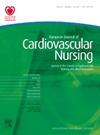Nurse-lead ambulatory follow-up of patients with heart failure compared to physician-guided management - experience of a single academic center
IF 2.9
3区 医学
Q2 CARDIAC & CARDIOVASCULAR SYSTEMS
引用次数: 0
Abstract
Background The follow-up of patients with chronic heart failure by a nurse in an outpatient clinic showed to be as effective as physician management for clinical and prognostic improvement of patients with chronic heart failure (CHF). The role of nurses is important and would improve the general condition of patients. Aim To determine the effect of nurse-lead ambulatory follow-up of patients with heart failure –when compared with physician-guided management of patients with CHF. Participants and methods Overall, 72 patients with HF were included in a structured ambulatory program after hospital discharge following the OptimizeHF Care Program protocol, with the active participation of a nurse in it. The patients were divided into two groups – group A – mostly managed by a trained nurse, and group B – predominantly led by a cardiologist with the helpof the nurse. Advice on diet and physical activity for all patients was provided by the nurse according to an established protocol and in accordance with current recommendations for non-pharmacology behavior in heart failure at the beginning of follow-up and at each visit.We use self-reported readiness of patients to comply with dietary and physical activity guidelines to measure adherence to the program at the end of the follow-up period. Results The patients in group A (21) were insignificantly more often females, with slightly higher ejection fraction, and a little bit older tjhn group B (61). After a 6-month follow-up, 61 finished the program. There was no significant difference in the outcomes – death or hospitalizations, between the groups . In group A, the improvement in the NT-pro BNP levels was more pronounced –94.7% vs 74.4% in group B (p=0.024). Numerically, nurse-lead patients had more often improvement in their functional capacity with 1 NYHA class – 95% vs 84% (p=0.23). Both groups had similar improvement in the 6-minute walking test and there was no difference in hemodynamic measurements and laboratory tests. The majority of the patients followed the advice for diet and physical activity – 81.7%. There was no significant difference in this indicator between the group managed by the nurse and that by the physician. The same similarity was recorded in the drug therapy at the end of the follow–up. Conclusions Our results confirm that the nurse-lead program for ambulatory management of patients with CHF is effective and safe compared to physician management and can be applied in various health systems. This will increase the importance of the health care professionals in the HF team.护士领导的心力衰竭患者门诊随访与医生指导的管理相比--一个学术中心的经验
背景 由门诊护士对慢性心力衰竭患者进行随访,结果显示,在改善慢性心力衰竭(CHF)患者的临床和预后方面,其效果不亚于医生的管理。护士的作用非常重要,可改善患者的总体状况。目的 确定由护士领导的对心衰患者的非住院随访与由医生指导的对 CHF 患者的管理相比效果如何。参与者和方法 72 名心力衰竭患者出院后,在护士的积极参与下,按照 "优化心力衰竭护理计划 "的方案,参加了一项有组织的流动计划。患者被分为两组--A 组主要由训练有素的护士管理,B 组主要由心脏病专家在护士的帮助下管理。所有患者的饮食和体育锻炼建议均由护士按照既定方案提供,并在随访开始时和每次就诊时根据心力衰竭非药物治疗行为的当前建议提供。结果 A 组患者(21 人)中,女性患者明显较多,射血分数略高,年龄略大于 B 组(61 人)。经过 6 个月的随访,61 人完成了计划。两组在死亡或住院等结果上没有明显差异。在 A 组中,NT-pro BNP 水平的改善更为明显,为 94.7%,而 B 组为 74.4%(P=0.024)。从数字上看,护士指导的患者的功能能力改善更多,NYHA分级为1级--95%对84%(P=0.23)。两组患者在 6 分钟步行测试中的改善情况相似,在血液动力学测量和实验室测试中也没有差异。大多数患者遵循了饮食和体育锻炼建议--81.7%。护士管理组和医生管理组在这一指标上没有明显差异。在随访结束后的药物治疗方面也有相同的记录。结论 我们的研究结果证实,与医生管理相比,护士领导的慢性阻塞性肺病患者门诊管理计划既有效又安全,可以在各种医疗系统中应用。这将提高医护人员在高血压团队中的重要性。
本文章由计算机程序翻译,如有差异,请以英文原文为准。
求助全文
约1分钟内获得全文
求助全文
来源期刊

European Journal of Cardiovascular Nursing
CARDIAC & CARDIOVASCULAR SYSTEMS-NURSING
CiteScore
5.10
自引率
10.30%
发文量
247
审稿时长
6-12 weeks
期刊介绍:
The peer-reviewed journal of the European Society of Cardiology’s Council on Cardiovascular Nursing and Allied Professions (CCNAP) covering the broad field of cardiovascular nursing including chronic and acute care, cardiac rehabilitation, primary and secondary prevention, heart failure, acute coronary syndromes, interventional cardiology, cardiac care, and vascular nursing.
 求助内容:
求助内容: 应助结果提醒方式:
应助结果提醒方式:


